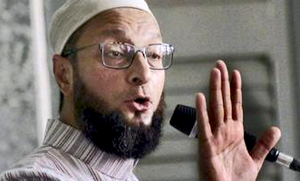Hyderabad, Sep 20: AIMIM, which will test electoral waters in Bihar this time, has attacked the grand alliance of RJD-JDU-Congress saying the track record of these parties speak very little and dismissed allegations of being propped by the BJP.

On his party's decision to contest polls in Bihar ruffling lot of feathers in the so-called secular camp, the Hyderabad Lok Sabha member said, "They have not done justice or development and their track record clearly shows that the real prosperity or justice has not been done. "We have decided to limit ourselves only to Seemanchal area and that too we are yet to take a decision on how many seats of 24 (in the region) we are going to contest. In constituencies where the AIMIM is not contesting, the party has requested the people of Bihar defeat BJP and to vote for any secular candidate or secular combination," he said.
"Despite that, they are fully drunk in arrogance and they don't want MIM to participate," Owaisi told PTI as he attacked the grand alliance of JDU, RJD and Congress. "If you see Seemanchal area, out of 24 (seats), BJP had won 13 in 2010. Am I responsible for that? And what is the number of Muslim representation? So, they are being badly exposed."
AIMIM's stand, he said, is very clear that it wants to contest on the plank of development and justice for Seemanchal region and "wherever we are not there (not contesting) in Seemanchal (that comprises four districts) or anywhere in Bihar, we request the people of Bihar to vote for secular candidate or secular combination." As for whether AIMIM is just testing waters in Muslim- dominated constituencies of Seemanchal or if it is serious about winning in the region, he said, "Of course, we are serious. We want to win the Assembly seats where we are contesting and we have to work hard and will definitely work hard to win the confidence of the people."
On charges by some sections of the grand alliance that AIMIM is being propped by the BJP to split secular votes, Owaisi said there were also (similar) allegations which were made against Kanshi Ram when he floated the BSP. "... Now they are incompetent and they are discredited. And that is why all these allegations are being made against me," he said and sarcastically added, "I don't mind it. They are honouring me by making all these allegations." Without naming the Congress, he said that party doesn't want to do introspection after (reverses in) Assembly elections in Delhi, Jharkhand, Haryana and Jammu and Kashmir and Delhi University, where his party had not even put up candidates, because of their arrogance.
"They want to point a finger at me. Fine. I have no issue." On growth strategy for the party and whether it has pan- India ambition, Owaisi said, "No, no. I don't have pan-India ambition. We will definitely contest in Uttar Pradesh (where Assembly elections are due next year) because in that state we have been working in the last two years and we are on a stronger ground over there. Organisationally also we will definitely contest in Uttar Pradesh."
He claimed that the Narendra Modi government has massively failed on the governance and economy fronts. "Reason for the victory of Modi was that he will provide governance, he will revive economy. But the government has failed massively and disappointed the people of India on these two fronts," Owaisi said.
"They are creating conflicts. Their whole discourse is not on development but on conflict whether it is beef ban or meat ban," he alleged. "Now, the culture minister has even questioned the nationalism of Muslims who are proud Indians," he said, referring to Mahesh Sharma's controversial statement that late President A P J Abdul Kalam was a great nationalist despite being a Muslim.





Comments
Add new comment